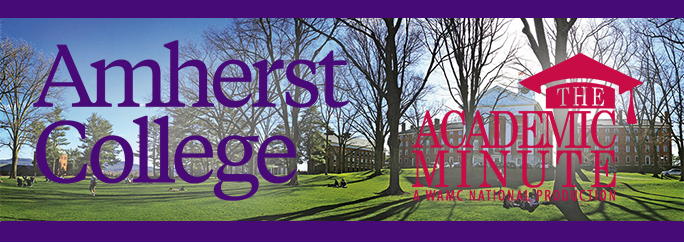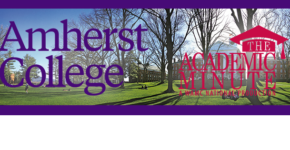
Academic Minute from 10.15 – 10.19
Monday, October 15th
David Jones – Amherst College
Vulcanism and Mass Extinctions
I am a geologist with interests in surface Earth history. I use stratigraphy and geochemistry to address questions about the co-evolution of life and Earth’s surface environments in deep time. Most of the rocks I study are carbonates, and I focus on early Paleozoic and Neoproterozoic time. I’m especially interested in 1) the end-Ordovician mass extinction and Ordovician/Silurian icehouse, 2) carbon and sulfur cycling in deep time, 3) effects of diagenesis on stable isotope ratios of C, O, S, Ca, and Mg, and 4) the origin and geochemistry of dolomite.
My field work has recently focused on sedimentary rocks in the Great Basin (Nevada, Utah) and modern playa lake deposits in California (Deep Springs Lake). Upcoming projects will include field work in Wyoming and Colorado. Past field work has included the Canadian Arctic, Mongolia, Italy, Atlantic Canada, and the Rocky Mountains.
Tuesday, October 16th
Sheila Jaswal – Amherst College
Retention of Women and Underrepresented Minorities in STEM
Sheila Jaswal is an associate professor of chemistry and member of the biophysics and biochemistry program at Amherst College. She attended Mills College in Oakland, Calif., where she graduated with a BA in biochemistry and German, then conducted research at the Max Planck Institute for Immunology in Freiburg, Germany, as a Fulbright Fellow. After receiving her PhD in biochemistry & molecular biology from the University of California at San Francisco, she served as a Damon Runyon Postdoctoral Research Fellow in the Department of Molecular Biophysics and Biochemistry at Yale University and a Senior Beckman Research Fellow at Stanford University. She joined the chemistry department at Amherst College in 2009 and has established an interdisciplinary research program with undergraduates combining the complementary strengths of experiments and theoretical modeling to discern fundamental principles of protein stability and dynamics. In 2016 she co-founded the Being Human in STEM(HSTEM) initiative with Amherst students, which aims to foster a more inclusive, supportive STEM community by helping students, faculty, and staff collaboratively develop a framework to understand and navigate diverse identities in the classroom, lab, and beyond.
Wednesday, October 17th
Josef Trapani – Amherst College
Hair Cells
Joe Trapani is an Associate Professor of Biology at Amherst College and is a faculty member in the Neuroscience Program. He is also an Associate faculty member of the Neuroscience and Behavior Program at UMass.
Joe received a B.S., M.S., and Ph.D. from the University of Connecticut and spent grad school studying the biophysical properties of potassium channels in the lab of Stephen J. Korn. From Connecticut, Joe traveled to Portland, Oregon for his postdoctoral research in the lab of Teresa Nicolson at the Vollum Institute and the Oregon Hearing Research Center at Oregon Health & Science University.
Thursday, October 18th
Catherine Sanderson – Amherst College
Bystander Effect
Catherine Sanderson is the Manwell Family Professor of Life Sciences (Psychology) at Amherst College. She received a bachelor’s degree in psychology, with a specialization in Health and Development, from Stanford University, and received both masters and doctoral degrees in psychology from Princeton University. Professor Sanderson’s research examines how personality and social variables influence health-related behaviors such as safer sex and disordered eating, the development of persuasive messages and interventions to prevent unhealthy behavior, and the predictors of relationship satisfaction. This research has received grant funding from the National Science Foundation and the National Institute of Health. Professor Sanderson has published over 25 journal articles and book chapters in addition to four college textbooks, a high school health textbook, and a popular press book on parenting. In 2012, she was named one of the country’s top 300 professors by the Princeton Review.
Friday, October 19th
Carrie Palmquist – Amherst College
Differences in Snap Judgments Between Children and Adults
The ability to communicate, especially for the purposes of teaching and learning, may be what distinguishes humans from many of our closest genetic relatives. The goal of my research is to explore the essence of our predisposition to teach and learn from others. Specifically, by examining the ways that young children behave in pedagogical situations, I hope to understand some of the fundamental expectations and assumptions that humans have about communicating for the purpose of conveying information to others. There are two main ways that children learn about the world around them: gaining first-hand experience (e.g., tasting a lemon and figuring out that it’s sour) and learning information from other people (e.g., hearing that lemons are sour, and believing what they’re told). Understanding the process by which children learn from others is particularly important because much of what children need to know about the world cannot be learned through first-hand experience (e.g., the fact that the earth is round), instead, they must simply listen to others and trust what they are told. Learning from others also requires that children be discerning in terms of who they trust: they need to identify and rely on those who are knowledgeable and helpful, and identify and ignore those who are ignorant or deceptive. My research is focused on better understanding how and when children choose to learn from others. One line of my research asks whether children evaluate others’ nonverbal cues (i.e., pointing gestures), in addition to their spoken language, to determine good sources of information. Another, more recent, line of my research explores the variation and complexity in how children learn from others. In this line of research, we explore whether individual differences, previous experiences, and context affect children’s decisions to trust others as good sources of information.

